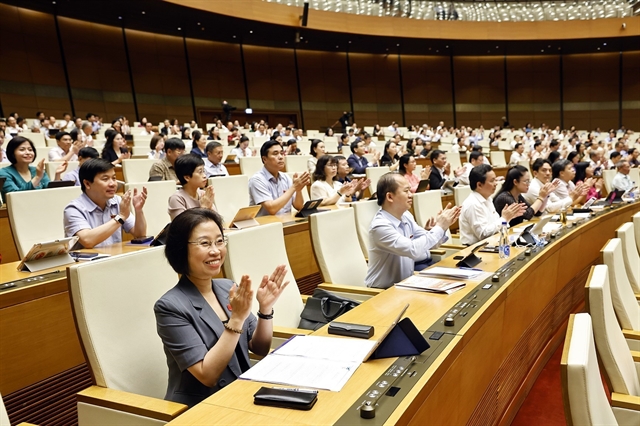With 453 out of 461 deputies in attendance voting in favour — a 94.8 per cent approval rate — the revised law updates various provisions on violations, online advertising, content standards and the responsibilities of influencers.

HÀ NỘI — The National Assembly on Monday passed the amended Law on Advertising, introducing several significant changes aimed at enhancing transparency, accountability and compliance in advertising activities, especially on digital platforms.
With 453 out of 461 deputies in attendance voting in favour — a 94.8 per cent approval rate — the revised law updates various provisions on violations, online advertising, content standards and the responsibilities of influencers.
One of the most notable revisions is to Article 11, which outlines the handling of violations in advertising activities. Under the new rules, individuals and organisations that breach advertising laws or related regulations may face disciplinary measures, administrative fines or criminal prosecution, depending on the severity of their violations.
If any damage is caused, violators must compensate the victims according to relevant laws. Authorities who issue incorrect handling decisions causing damage must also be held accountable and provide compensation as required.
Amendments to Article 19 emphasise that advertising content must be honest, accurate and clearly presented. It must not mislead consumers about the features, quality or effects of products and services.
Mandatory warnings, advisories or disclaimers must be prominently displayed, clearly visible, easy to access and in contrasting colours. Text must not be smaller than the smallest font used in the ad, and if read aloud, must be delivered at a speed and volume equivalent to other parts of the ad.
The law clarifies that materials such as product displays, promotional materials and trade fair content — with exceptions for functional foods and dietary-specific products — are not considered advertising content if provided solely for promotion or introduction purposes.
In a move to improve the reader and viewer experience, the revised law tightens limits on advertising in print and broadcast media.
According to articles 21 and 22, advertisements may not exceed 30 per cent of a newspaper's total space or 40 per cent of a magazine’s space, excluding advertising-specialised publications and supplements. Likewise, advertising must be clearly distinguishable from editorial content.
For broadcast media, ads may only take up 10 per cent of daily airtime on free-to-air channels and 5 per cent on paid subscription channels. These restrictions do not apply to advertising-dedicated channels.
The revised law introduces comprehensive regulations for digital advertising under Article 23. Online ads — including those on e-newspapers, websites, social networks, mobile apps and digital platforms — must be clearly identifiable through text, symbols or sounds to distinguish them from other content.
Floating or non-fixed ads must include easily recognisable icons that allow users to close the ad, report inappropriate content or opt out. Ads containing external links must lead to content that complies with Vietnamese law, and both advertisers and publishers must implement measures to monitor linked content.
Social media platforms must provide users with tools to distinguish advertising content from organic content. Influencers and content creators are also required to clearly label paid or sponsored content.
A key focus of the amended law is greater accountability for those who promote products, particularly influencers and public figures.
The newly added Article 15a defines individuals who convey advertising content — such as influencers — and outlines their obligations. They must be able to provide documentation on the ad content upon request by authorities, and are responsible for verifying the credibility of the advertiser.
Responding to calls for influencers to be held liable for false or misleading advertisements, lawmakers clarified that all parties involved in the advertising chain would be subject to sanctions depending on the nature and severity of violations. A proposal to restrict influencers to promoting products within their area of expertise was not adopted, with legislators confirming that the law already includes sufficient oversight measures.
However, the timing and format of notifications when influencers share ads have been clarified to ensure transparency.
While some had proposed requiring cross-border digital platforms to establish legal representation in Việt Nam, the National Assembly's Standing Committee deemed such a mandate inconsistent with Việt Nam’s WTO commitments. Instead, the revised law assigns responsibility to all online advertising service providers, including foreign individuals and entities.
Foreign advertisers wishing to run campaigns in Việt Nam must partner with local licensed advertising firms in accordance with current commercial laws.
The amended Law on Advertising will officially take effect from January 1, 2026. — VNS





